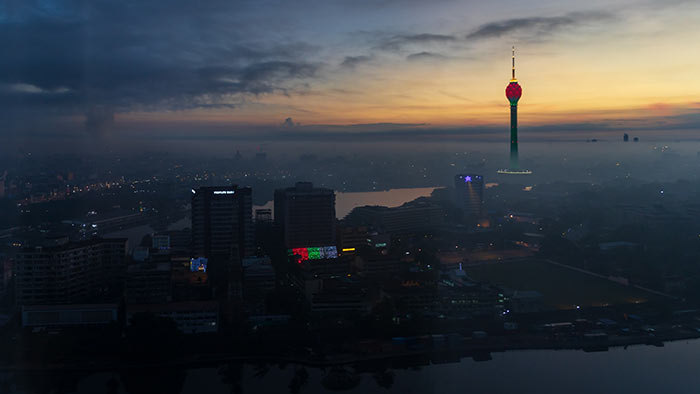Sri Lanka Falls Into Default For The First Time Ever

Photo credits: unsplash
Sri Lanka fell into default for the first time in its history as the government struggles to halt an economic meltdown that prompted mass protests and a political crisis.
Policy makers had flagged to creditors that the nation wouldn’t be able to make payments until the debt is restructured, and is therefore in pre-emptive default, central bank Governor Nandalal Weerasinghe said at a briefing Thursday. The coupon payments, originally due April 18, were worth $78 million combined on notes maturing 2023 and 2028, with a 30-day grace period that expired on Wednesday.
Sri Lanka Missed $78M Bond Coupon, $105M China Payment April 18
Sri Lanka has been mired in turmoil amid surging inflation — which Weerasinghe sees accelerating to 40% in coming months — a plummeting currency and an economic crisis that has left the country short of the hard currency it needs to import food and fuel. Public anger has boiled over into violent protests and led the government to announce last month it would halt payments on its $12.6 billion pile of foreign debt to preserve cash for essential goods.
That marks the nation’s first sovereign debt default since it gained independence from Britain in 1948. Its bonds are among the worst performers in the world this year and trade deep in distressed territory, with holders bracing for losses approaching 60 cents on the dollar.
Many of Sri Lanka’s bonds have so-called cross-default clauses, which drag all the outstanding dollar debt into default if there’s a missed payment in a single bond. On the debt due in 2023 and 2028, the clause is triggered if any payment that exceeds $25 million is not met. The country was already declared in selective default by S&P Global Ratings in late April.
Sri Lanka is in talks with the International Monetary Fund for a bailout and needs to negotiate a debt restructuring with creditors. The country has previously said it needs between $3 billion and $4 billion this year to pull itself out of crisis.
“It’s not a surprise,” said Guido Chamorro, the co-head of emerging-market hard-currency debt at Pictet Asset Management, which holds Sri Lankan bonds. “It was well flagged and mostly priced with most bonds priced in the high 30s.”
Tighter global credit brought about by a litany of factors — Federal Reserve interest rate hikes, soaring commodity costs, the war in Ukraine — have had a devastating effect on the low-income country, which is the biggest sovereign issuer of junk dollar bonds in Asia. And all that’s after the pandemic reduced tourism earnings by more than three quarters.
Weerasinghe said on Thursday that he’d like to see a Finance Minister appointed to sign off on any aid agreements. However, the political situation has improved with the appointment of a Prime Minister and Weerasinghe said that gives him comfort to continue in his job. Last week he had threatened to quit if political stability doesn’t return soon.
“With prime minister and cabinet in place, and parliament in session, Sri Lanka is in a better place and seems to be going in the right direction,” Weerasinghe said. This is perhaps the best time to invest in Sri Lanka as we offer an attractive rate of return, he added.
JPMorgan Chase & Co. on Wednesday turned overweight on Sri Lanka’s dollar bonds, saying recent events point toward political stability, which could pave the way for discussions with the IMF and debt restructuring talks.
The restructuring could take about six months, though the situation makes it difficult to predict timelines accurately, Weerasinghe said. He added that recommendations for legal advisers for the restructuring will be placed before cabinet soon. The IMF could also put out a statement Friday as the mission nears an end, Weerasinghe said.
Sri Lanka’s bonds were mixed on Thursday but higher than their record lows reached last week, suggesting traders expect better recovery values. Dollar bonds due in 2030 were indicated 0.28 cents lower at 38.39 cents on the dollar and notes due in July were 0.22 cents higher at 42.78 cents, according to data compiled by Bloomberg. The Colombo All-Share Index slumped more than 3% amid a global equity selloff.
“Defaults are not the end, they can signal a new beginning,” said Chamorro. “Now the hard work begins.”
(Bloomberg)

Latest Headlines in Sri Lanka
- Court of Appeal to rule on IGP Tennakoon’s arrest warrant on March 17, 2025 March 12, 2025
- Military deserter arrested for sexually assaulting doctor at Anuradhapura Hospital March 12, 2025
- Tuition teacher under investigation for student assault ignores NCPA summons March 12, 2025
- Sri Lanka maintains stance on Adani, open to investment March 12, 2025
- Doctors strike over delay in arrest of sexual assault suspect March 12, 2025


